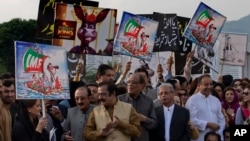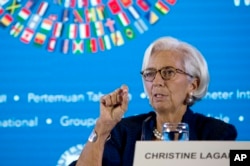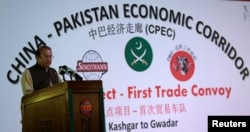The International Monetary Fund (IMF) says Pakistan has formally requested financial assistance from the lender to help address the country’s economic challenges.
Pakistani Finance Minister Asad Umar submitted the request to IMF Managing Director Christine Lagarde during a meeting on the sidelines of the IMF and World Bank annual conference in Bali, Indonesia.
“An IMF team will visit Islamabad in the coming weeks to initiate discussions for a possible IMF-supported economic program,” an IMF statement Thursday quoted Lagarde as saying. “We look forward to our continuing partnership,” she added.
The statement did not specify how much money Pakistan is seeking.
About $12 billion
Pakistani Prime Minister Imran Khan said Wednesday his government needs about $12 billion in the short term to steer the country out of a looming balance-of-payments crisis.
In addition to an IMF bailout package, Khan said, the government is also seeking temporary loans from “friendly countries” to bridge the funding gap and boost Pakistan’s depleting foreign exchange reserves that hit a four-year low of $8.4 billion last week.
“We will get out of this. I will take (the country) out of this (crisis),” the prime minister, who took office in August, vowed in nationally televised comments.
Islamabad has gone to the IMF many times since the late 1980s. The last time was in 2013, when the government of former Prime Minister Nawaz Sharif got a $6.6 billion loan to tackle a similar crisis.
Pakistan’s rupee currency has suffered a record 7 percent devaluation since early this week when Khan’s young government announced it would seek IMF assistance to tackle a mounting balance of payments crisis.
Belt and Road
Critics have cited, among other factors, China’s infrastructure loans to Pakistan as part of an economic development program Beijing has launched in its South Asia ally as part of President Xi Jinping’s global “Belt and Road Initiative” (BRI).
The United States, which is critical of China’s lending under BRI for allegedly saddling developing countries with debts, has cautioned Pakistan could use an IMF bailout package to pay off Chinese loans, assertions Islamabad and Beijing dismissed as misplaced.
U.S. State Department spokesperson Heather Nauert reiterated Thursday Washington’s reservations about Pakistan’s plans to seek IMF bailout package.
“This is something that we’ve been tracking fairly closely. ... I think part of the reason that Pakistan found itself in this situation is Chinese debt and the fact that there is debt that governments have incurred that they maybe thought wouldn’t be so tough to bail themselves out of, but has become increasingly tough.”
Beijing and Islamabad maintain their mega-collaboration under the multibillion dollar China Pakistan Economic Corridor (CPEC), which is building transportation network, ports and power plants, has nothing to do with the current economic challenges facing the country.
Pakistan’s total external debt stands at just more than $69 billion, including $8.3 billion Chinese loans.
Absolute transparency
Lagarde also responded to those concerns at a news conference just a few hours before she announced receiving the funding request from Pakistan.
She emphasized that any IMF loan to Pakistan or other countries requires “a complete understanding and absolute transparency about the nature, size and terms of the debt that is bearing on a particularly country.”
This requires, explained Lagarde, an assessment of both sovereign and state enterprise debt to actually determine the debt sustainability of a country as financing programs are considered.
Khan, who came to power on an anti-corruption agenda, blames previous Pakistani rulers’ alleged mismanagement and corruption for current economic woes. He has vowed to recover the stolen funds, most of which he asserts, have been stashed away in foreign bank accounts to buy expensive properties.
Critics warn of higher bills, taxes
Critics say an IMF program would lead to increased utility bills, rising taxes, further depreciation of the rupee and a slowdown in economic growth. The measures would undercut Khan’s election promises, including 10 million new jobs and the establishment of a “welfare state” during the government’s five-year mandated term in office.
Khan dismissed criticism Wednesday and encouraged Pakistanis not to get frustrated.
“This is a very small period (of crisis). Our country is a rich country, it is blessed by Allah. This country will come out of crisis,” he said. Khan went on to announce an ambitious massive nationwide low-cost house scheme with the aim of building 5 million homes in the next five years.
The Pakistani government has embarked on a series of populist austerity measures such as dedicating the palatial prime minister’s complex in Islamabad to building a university, retaining just four people to serve Khan from more than 500 staff the previous leaders used, and auctioning luxury cars.






